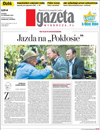“Pokłosie (Aftermath) under attack”, headlines Gazeta Wyborcza as Polish director Władysław Pasikowski’s latest film sparks controversy. Inspired by the story of some three hundred Polish Jews murdered in the village of Jedwabne in Nazi German-occupied Poland in 1941, Aftermath depicts men, women and children being herded into a barn by their Polish neighbours and burned alive. Conservative commentators have lambasted the movie, arguing it puts collective blame on the whole nation and presents a false view of history in which Poles are shown as “evil anti-Semites” and “Holocaust co-perpetrators”. Piotr Zychowicz stresses in the conservative weekly Uważam Rze —
No nation has a monopoly on being evil and no nation has a monopoly on being good. Nations are composed of millions of people, and people, it so happens, are very different.
The liberal Gazeta Wyborcza appeals, in turn, for commentators to stop trying to halt the “cleansing process” with “nationalistic ideology”. It points out, quoting Tomasz Gross’s famous book, Neighbours, that there were Poles who killed Jews simply for profit. The daily defends Aftermath, calling it a —
... valuable work, unique in Polish cinema, reopening an only superficially healed wound of the Polish conscience.
Do you like our work?
Help multilingual European journalism to thrive, without ads or paywalls. Your one-off or regular support will keep our newsroom independent. Thank you!
















